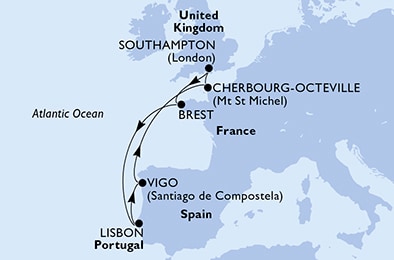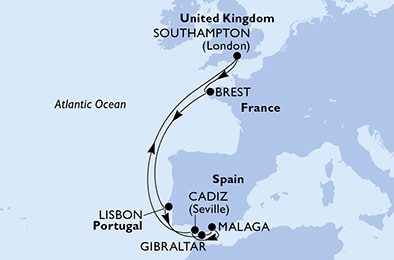
Port Brest
Brest, located in northwest France in the region of Brittany, is a dynamic port city with a rich maritime heritage. As one of France's most important naval bases, Brest is closely tied to the sea, with its natural harbor playing a vital role in its history and economy. The city is home to the Château de Brest, a medieval fortress that now houses the National Naval Museum, showcasing centuries of naval history. Another key attraction is the Pont de l'Iroise, an impressive cable-stayed bridge that offers panoramic views of the harbor and surrounding landscapes.
Brest is also known for its vibrant cultural life and modern atmosphere, having been largely rebuilt after World War II. The Océanopolis aquarium is a must-visit, offering an immersive exploration of marine ecosystems from around the world. The city’s proximity to the stunning coastline of Brittany makes it a gateway for exploring natural wonders, including the Crozon Peninsula and Iroise Sea, which are perfect for hiking, sailing, or simply admiring the rugged beauty of the region. Brest’s mix of maritime heritage, cultural attractions, and coastal charm makes it a captivating destination.
History
Brest, a historic port city in Brittany, France, has been a strategic maritime hub since ancient times. Under Roman rule, the site was fortified, and its strategic importance grew over the centuries due to its location on the Atlantic coast. In the 17th century, Cardinal Richelieu and later Vauban, Louis XIV’s military engineer, transformed Brest into one of France's key naval bases by fortifying its harbor and building extensive shipyards. These developments cemented its role as a cornerstone of France's naval defense and shipbuilding industry.
During World War II, Brest was heavily bombed and virtually destroyed, as it served as a critical German submarine base under Nazi occupation. After the war, the city was rebuilt with a modern architectural style, contrasting with its historic past. Despite its wartime losses, Brest remains one of France’s most important naval bases and a center for maritime research and innovation, while maintaining remnants of its storied history, such as the Château de Brest and its enduring maritime legacy.








